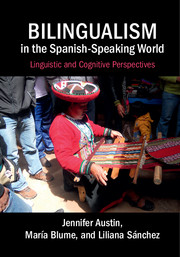Introduction
Published online by Cambridge University Press: 05 May 2015
Summary
In this book, we will examine the impact of bilingualism on the languages and minds of users of more than one language. In the past twenty years, there has been a dramatic increase in the number of studies published on bilingualism (Bialystok 2007), and this research has uncovered significant lifelong consequences for the linguistic and cognitive abilities of multilingual speakers. However, these studies have often been conducted on a particular subset of bilinguals, namely university-educated professionals (or their children) who are fluent speakers of the majority language. As a result, important questions regarding the cognitive effects of bilingualism are usually considered in isolation from how they are affected by the membership of the bilingual individual in communities with varying degrees of bilingualism. We examine how research on the effects of bilingualism on linguistic and cognitive development has been shaped by a wide range of (sometimes competing) theoretical assumptions, with examples and case studies drawn primarily from three bilingual communities: Spanish–English bilinguals in the USA, Spanish–Quechua bilinguals in Peru, and Spanish–Euskara (Basque) bilinguals in Spain. We have chosen these groups because they provide diverse perspectives on the experience of being bilingual in distinct cultural, political, and socioeconomic contexts.
A further goal of this book is to shed light on the notion of degrees of communal bilingualism (referred to as bilingual continua). These continua of bilingualism are found in contexts involving language contact, the formation of creole varieties, and first language loss. By analyzing the results of previous work on the effects on bilingualism of different amounts of language input at home and in school and of different types of communicative interactions, we hope to provide a better understanding of some emerging conceptual views of bilingualism. One of them is the notion of the heritage speaker (Wiley and Valdés 2000), a widely used term that refers principally to bilingual speakers in the USA but covers a wide range of abilities from passive bilinguals (individuals who understand Spanish but are not able to engage in active conversation at an advanced level) to speakers who begin to acquire a formal register in college after a period of English-only education.
- Type
- Chapter
- Information
- Bilingualism in the Spanish-Speaking WorldLinguistic and Cognitive Perspectives, pp. 1 - 38Publisher: Cambridge University PressPrint publication year: 2015



